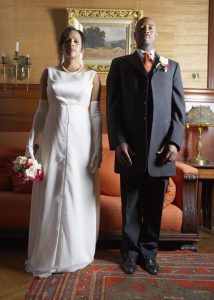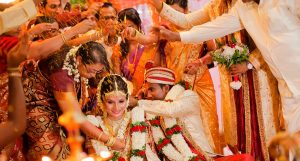Bollywood actors Deepika Padukone and Ranveer Singh married as per South Indian traditions (Konkani wedding) in Italy’s Lake Como on Wednesday, 14th November 2018 afternoon in Italy and the couple will be taking their wedding vows according to Sindhi traditions on the next day. Deepika and Ranveer’s extremely private wedding happened in the presence of their families and close friends. Wedding ceremonies serve several purposes and they are often a cherished moment in a couple’s lives. A wedding ceremony is often utilized as a public display of marriage vows and of the couple entering into the marital contract. For most couples, the focus of the wedding ceremony, is on their commitment and love for each other.
The most important part of any wedding ceremony is the words utilized to proclaim never-ending love and appreciation between each unique couple. A wedding ceremony will include other elements, such as an offering of the love and support of family and friends present. In addition, a religious wedding ceremony helps couples commit their relationship to God (in temple, church, mosque).
Hindu marriages are based on age old traditions that have been translated into laws. According to traditions, a Hindu marriage cannot be reversed and is irrevocable. The modern day Hindu Marriage laws prohibit Polygamy or Polyandry. In India as well as most Hindu cultures across the world, arranged marriages are still the most preferred way of getting hitched. Consent and happiness of the families are of utmost important in Hindu culture as the marriage not only union of two souls, but also union of two families!
Even in this age of high-tech living, where life has become like a fast forward movie, wedding is still considered important to many people around the world. Most of the religious sectors view it as a necessary and sacred undertaking in order to adhere to their basic teachings. Christianity for example, has many wedding ceremonies that are practiced in every nation that believes in it. Muslims have their own traditions and practices also in celebrating wedding events. Although polygamous lifestyle is allowed by them, wedding is still an important event in the life of a Muslim believer.
In today’s world, we are witnessing many couples who live together without getting formally married. But, it is still not accepted wholeheartedly by the larger society. Couples say, we have accepted each other and are committed to each other. But, when you participate in a wedding ceremony, you’ll be asked to talk about your commitments. And your answer is always on the confirmatory. There are of course some exceptions like some couples who live under one roof and got married just for the sake of convenience.
You rarely see someone who is not excited about getting married. Most of the people are thrilled with the exception of those under pressure when their wedding was held. Wedding is one of the most important events in life of a person. It’s the start of a process in building a family. Wedding is the symbol of commitment and the foundation of your love to your partner. Building a warm home starts with choosing your partner for life. And this is officiated in a ceremony called wedding. A marriage rite is therefore important because it binds two people in a lifetime commitment.
Let’s look at different styles of wedding rites around the world:
In Congo it seems Congolese brides and grooms must keep their happiness in check; during their entire wedding day, from ceremony to reception, the two are not allowed to smile. If they do, it would mean they weren’t serious about marriage. Well, this is their custom. While most about-to-be married couples brim with excitement and eagerness, in this country the bride and groom have to present serious faces.
In China, a groom will shoot his bride with a bow and arrow several times then collects the arrows and breaks them during the ceremony, to ensure their love lasts forever. What would Cupid do?
In France, brides and grooms traditionally eat chocolate and champagne after the reception. But, do you know that they must consume these treats from a toilet bowl? The point is to give the twosome strength before their wedding night; unfortunately, if the bowls are not clean, it might give them something else.
In Fiji, when a man asks a woman’s father for her hand in marriage, he must present his future father-in-law with a whale’s tooth.
While in many brides-to-be in other countries go on strict diets to lose weight before the wedding. It is not so in Mauritius, where young girls are forced to pack on the pounds before their weddings. The chubbier she is the better for the husband who is thought to be wealthy with such a well-fed wife!
In Germany, the bride and the groom are supposed to do housekeeping ritual together. German brides and grooms clean up piles of porcelain dishes that their guests threw on the ground to ward off any evil spirits. The lesson: when the couple works together, they can face any challenge thrown their way.
Whereas in Scotland, the couple elopes! It seems centuries ago England restricted marriage for couples who were 21 and above. But that didn’t stop young lovers from finding a loophole, or to elope to a nearby Scottish town without such limitations. Today that village, Gretna Green, is still popular for couples who want to elope.
In Guatemalan, as wedding reception hosts, the parents of Guatemalan grooms can do whatever they want, including smash things. When the newlyweds arrive, it’s a tradition that the groom’s mom breaks a white ceramic bell, filled with grains like rice and flour, to bring prosperity to the couple!
So friends, a wedding ritual in any part of the world is performed to state a couple’s wedding vows and the love and support of their family and friends. Guests help to celebrate the couple’s commitment to each other. Wedding ideas and practices are rooted in historical practices. Most couples even today choose to hold a ceremony that is practiced in age-old style, while adding some individualized sentiment to the occasion. The most important part of a wedding ceremony is the vows between the bride and groom. The vows help couples to state publicly their commitment to the relationship.
















































